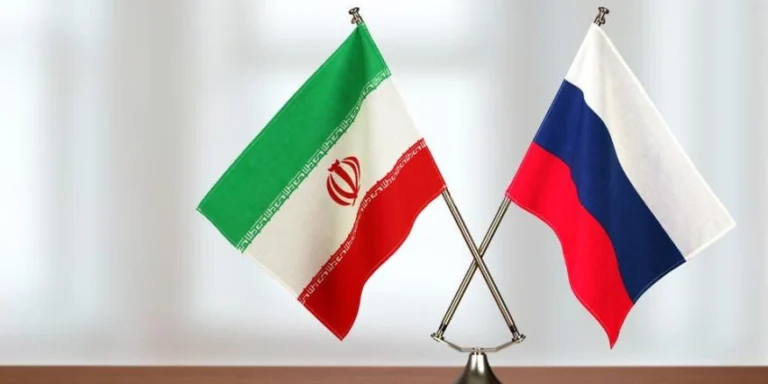Critical 2025 Talks: Russia-Iran Strategic Summit Addresses Middle East Escalation and Nuclear Program

Russia and Iran deepen strategic ties as nuclear talks advance—flags crossed in a symbol of growing alliance. 20/7/2025
July 20, 2025 Hour: 10:29 am
Russia-Iran strategic talks on Middle East tensions and the nuclear program. Putin and Larijani emphasize diplomacy and sovereignty amid global concerns and rising geopolitical friction.
Related: 3 Critical Reactions to the Iran Nuclear Program After U.S. Strikes on Facilities”
Geopolitical Context Behind the Russia-Iran Strategic Talks
The Russia-Iran strategic talks on Middle East and nuclear program gained renewed importance as Russian President Vladimir Putin met with Ali Larijani, advisor to Iran’s Supreme Leader, at the Kremlin on July 21, 2025. The discussions came at a time of heightened regional tensions, with conflicts in Gaza, Lebanon, and Yemen contributing to an increasingly volatile geopolitical climate.
The meeting also underscored the deepening strategic alignment between Moscow and Tehran, particularly in response to Western pressure and unilateral sanctions. Both nations reaffirmed their commitment to multilateralism, the Joint Comprehensive Plan of Action (JCPOA), and the principle of non-interference in domestic affairs.
🔗 Kremlin – Official Meeting Statement
Putin and Larijani Discuss Middle East Escalation
During the Russia-Iran strategic talks on Middle East and nuclear program, President Putin and Ali Larijani exchanged views on the rising instability in the Middle East, a region marked by military confrontations, political polarization, and humanitarian crises.
Both leaders emphasized the need to prevent armed conflicts and support initiatives that promote lasting peace and stability, especially in areas where external interventions have intensified violence.
Putin reiterated the importance of diplomatic engagement, while Larijani reaffirmed Iran’s commitment to a peaceful nuclear program and its right to self-determination. The conversation also touched on Syrian peace efforts, regional security, and countering unilateral sanctions.
Russia Reaffirms Support for Iran’s Nuclear Program
A key topic of discussion was the Iranian nuclear program, which has remained under international scrutiny for years. Russia, a signatory of the 2015 Joint Comprehensive Plan of Action (JCPOA), reiterated its support for IAEA-led verification mechanisms and the peaceful development of nuclear technology in Iran.
Putin emphasized that multilateral agreements must be preserved, warning against unilateral actions that could undermine diplomatic frameworks. Larijani, for his part, reaffirmed Iran’s commitment to a civilian nuclear program, guided by religious and legal principles that prohibit the development of nuclear weapons.
The talks also touched on the possibility of further technical cooperation between the two nations, including joint energy projects and civilian nuclear infrastructure development.
🔗 IAEA – Iran Nuclear Program Reports
Strategic Alignment Between Russia and Iran
The Russia-Iran strategic talks on Middle East and nuclear program highlight a growing partnership that spans defense, trade, energy, and diplomacy. Over the past decade, both nations have strengthened ties in response to Western sanctions and geopolitical isolation.
The meeting in Moscow also addressed joint efforts in Syria, regional security coordination, and the role of the Shanghai Cooperation Organization (SCO) and BRICS in reshaping global governance.
“This is not just a bilateral meeting — it’s a strategic alignment,” said a Russian foreign policy analyst. “Moscow and Tehran are reinforcing a multipolar world order that challenges Western dominance.”
Russia’s Stance on the Iranian Nuclear Program
Russia continues to support the peaceful development of Iran’s nuclear program, emphasizing the importance of IAEA oversight and diplomatic dialogue. Moscow has consistently opposed Western-led sanctions and calls for a return to JCPOA negotiations, despite the agreement’s partial collapse in recent years.
Putin reiterated the importance of non-proliferation mechanisms and diplomatic engagement, while Larijani stressed that Iran’s nuclear policy is rooted in international law and national sovereignty.
Both sides also discussed the potential for future nuclear cooperation, including joint research and energy projects, reinforcing the civilian nature of Iran’s program.
Broader Implications for Global and Regional Security
The Russia-Iran strategic talks come amid a fragile global security landscape, with conflicts in Ukraine, Gaza, and Yemen contributing to a multipolar diplomatic shift. As Western powers maintain pressure on both nations through sanctions and military alliances, Moscow and Tehran are deepening their cooperation to counterbalance these forces.
Analysts say the meeting may influence future nuclear diplomacy, particularly as Iran seeks to expand its civilian nuclear capabilities and Russia faces isolation in European energy markets.
The United Nations and Western governments have expressed concern over the growing Russia-Iran strategic alignment, particularly in areas of defense and nuclear cooperation.
🔗 UN Security Council – Iran Nuclear Reports
Conclusion: Toward a Multipolar Diplomatic Order
The Russia-Iran strategic talks on Middle East and nuclear program represent a significant diplomatic moment in the evolving global order. As both nations face increasing pressure from Western powers, they are reinforcing a strategic partnership that spans politics, defense, energy, and regional security.
While the West warns of potential risks, Moscow and Tehran frame their cooperation as a defensive and diplomatic effort, aimed at preserving sovereignty, peace, and stability in a world increasingly defined by unilateralism and conflict.
The outcome of this meeting may shape future nuclear diplomacy, regional stability, and the broader geopolitical landscape in the months ahead.
Author: JMVR
Source: Al-Mayadeen

